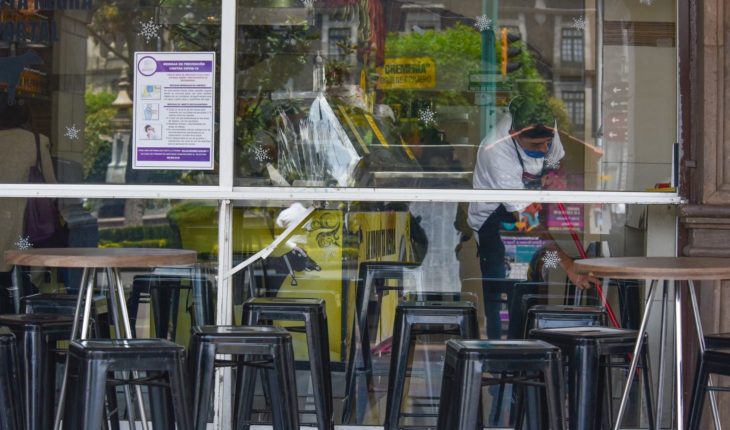“It’s all scary, sales are down 80%, I’m going bankrupt”
Jonathan Gabriel Navarrete Esparza, 33, missed the food of his home state, Campeche, when he worked in a government office in Mexico City. Almost four years ago, together with his brother, they decided to put the restaurant “La casa de mi apa”, located in the Narvarte colony. “It’s quite a career, I’ve put my savings in, my effort, I’ve worked 365 days a year,” he says.
Navarrete explains that he has already endured the times of the 2017 earthquake. “We had three very difficult months, but we did it. We broke the guard and went out in front of that madrasah, which was also big. People disappeared and we survived it. Now I find it very difficult,” he regrets.
Fear of the coronavirus pandemic, which in Mexico accounts for 316 cases and two deaths, but which in the world already totals more than 330 thousand contagions and about 15 thousand deaths, has collapsed its business. “We’ve lost 80% of sales,” he says.
The man says he wanted to keep working, but that he had to ask his six employees to go home because on payday he was forced to put it out of his pocket. “I can hold on for another month or two, but I have to know what I’m going to do, I can’t go into debt anymore,” he says.
On Sunday, the head of government of Mexico City decreed the closure of theaters, bars, cinemas, dens, canteens and sports spaces because of the COVID-19 epidemic. Hours later, the Ministry of Culture followed suit and announced the abolition of cultural activities throughout the country.
Navarrete doesn’t care because restaurants still have no order to close. But you know the order could come in well soon. Also, even if there was no official instruction, I might have to throw the blind in the absence of customers.
“This started to be noticed three weeks ago, but the hard impact was last week,” he says. For the weekend, Navarrete explains, his friends, the irreducible, barely came to the premises. “A lot of people tell me they’re afraid. Society is afraid,” he complains.
Navarrete says he wants to put up with everything he can to see if the aids promised by Sheinbaum arrive. But he doesn’t trust him.
“I don’t want to go on to borrow myself. So I’ve read this is going to last a while,” he explains. “This week I’ll sit with the real estate company. I’m four months away from finishing my contract. I don’t know what I’m going to do. I have the skewers on the floor,” he says.
Despite the threat of bankruptcy, today he will open his business. And if he can, he’ll try to serve food at home. “I open. I’ll be there until the last moment. We’d rather die of coronavirus than starve,” he says.
The last two viewers of the Tonalá cinema
The Tonalá cinema, in South Rome, had its last session on Sunday. The films: “The Waves” by Trey Edwars Shults, and “Honey Boy”, by Alma Har’el. There were only spectators for the second: two people. Starting Monday, the screen will turn off indefinitely.
“We are extremely concerned,” says Rodrigo David Ortigosa, 41, and commercial director of film and restaurant. “We are a project that practically lives up to date. Besides, we’re not firing anyone, we want to support them,” he explains.
The same day Sheinbaum announced the cessation of cultural activities closed the Tonalá cinema, both the halls and the restaurant. “We were left with home delivery through Rappi,” Explains Ortigosa.
“This isn’t going to be enough to cover,” he says. The company has 30 employees in Mexico City and another 20 in Tijuana. So they try to invent other formulas to hold the pull until the coronavirus passes.
Ortigosa explains that they are scheduled for a donation campaign in Donadora that will begin next Wednesday. In addition, they will advance the Project Tonalá TV, a streaming platform on which you can also rent movies for 30 pesos.
“The situation is coming hard. We don’t know how long we’re going to be like this,” he says.
Your concern, he says, is employees’ salaries. That is why she also relies on the aid promised by the head of government, Claudia Sheinbaum. Explains Ortigosa that restaurants in the Roma, Condesa and Juarez colonies have teamed up in a group called Barrio Unido to jointly raise their demands.
Among your claims: Support with the payment of electricity and water services from the past year, additional 90 days for tax returns and tax payments, payroll payments and allowances for those who depend on tipin tip and who are recognized as a claim “in order to claim consequential damages and losses”.
Sheinbaum announced that he will make public support measures on Tuesday. Ortigosa recalls that many of its workers “live up to date” and rely on state support and community solidarity. “There are large groups that did internships with which we do not commune. We are a community project to transform society through culture,” he said.
Restaurant petitions: credits and rent removals
Rodrigo Estrada, executive chef and partner of Pan y Sal, a restaurant located in Polanco, says he has been lucky this week. He claims that he has lost 80% of the clientele but that it could have been worse, that others have lost up to 95%,
“We don’t have a way to resist this,” he says.
He explains that half of his workforce has taken unpaid leave, “agreed with the same staff”, to reduce payroll expenses by 50%. “With this we hope to last three weeks, which is what we calculate this can be. We don’t want to see ourselves in the need to fire,” he says.
The coronavirus crisis has been a disaster for the business, the chef explains.
“Many restaurants have already closed, the few we remain open are confident that the community will support us,” she explains.
To do this, in Agua and Sal they have developed two strategies: one, the food at home, which seems the refuge of all the restaurants that will try to remain open until the last customer stops calling them. Another, the “gastronomic bonuses”, vouchers for 500 and 1000 pesos, a kind of “gift card” that the customer pays now and will be able to enjoy when the situation has improved.
On possible government aid, Estrada explains that some 200 locals have joined a group of restaurants to lead a common position in the dialogue with Sheinbaum. “We want to try to unite in one voice,” he says.
Their requests include: low credits for restaurants, negotiating with landlords to achieve some take-off in paying rent and renegotiating the credits accessed earlier by the premises.
“The picture is not encouraging at all,” says the chef. The health recommendation not to leave home to avoid contagion hits a business that depends on the customer’s visit.
“We can’t do home office,” he says.
From theatre to Youtube channel
Laura Vega, 48, should have jumped on the stage for the National Arts Center this weekend. She is one of the actresses who participate in “Project Women”, a work of the company Vaca 35 Theater in Group that reflects on “what it means to be a woman”.
For five weeks the play should have been performed. But only the fourth one was reached. According to Vega, last week they were warned that it would have to be cancelled. They didn’t even wait for Sheinbaum’s announcement. In the end, many institutions, public and private, pre-empted government restrictions and closed their projects.
For Vega, the closure of the theaters is also the end of almost every work activity: castings, rehearsals, future projects.
“We don’t have insurance, we’re unprotected,” he explains, referring to the artists’ guild.
The actress explains that, with the planned collapse by the coronavirus, many colleagues are looking for alternatives such as creating channels on Youtube.
“The state shows that culture is not important to them. But it is,” he says.
In its view, a policy of closures affecting different sectors is not reprehensible. But it does believe that the Secretary of Culture should articulate a plan to guarantee payment even if the function does not take place. As happened to them.
“There are 200 people in the room and there is no space, there can be contagions,” he admits.
For her, the daily search for papers has been stopped. At least, as long as the pandemic lasts.
CoVID-19 came to change everyone’s life.
What we do in Animal Político requires professional journalists, teamwork, dialogue with readers and something very important: independence. You can help us keep going. Be part of the team.
Subscribe to Animal Político, receive benefits and support free journalism #YoSoyAnimal.
translated from Spanish: How do bars, theatres, cinemas and restaurants cope with closure in CDMX?
March 23, 2020 |





